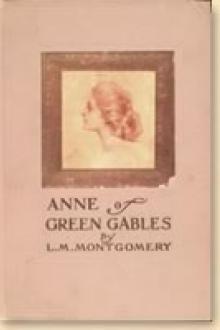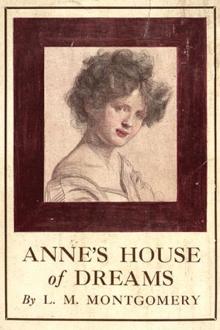Anne of the Island, Lucy Maud Montgomery [short story to read TXT] 📗

- Author: Lucy Maud Montgomery
- Performer: 0553213172
Book online «Anne of the Island, Lucy Maud Montgomery [short story to read TXT] 📗». Author Lucy Maud Montgomery
“I don’t believe it,” said Anne flatly. In her secret soul she thought that the beautiful, poetical things said to AVERIL would win any girl’s heart completely. Besides, it was gruesome to hear of AVERIL, the stately, queen-like AVERIL, “pitching” any one. AVERIL “declined her suitors.”
“Anyhow,” resumed the merciless Mr. Harrison, “I don’t see why MAURICE LENNOX didn’t get her. He was twice the man the other is. He did bad things, but he did them. Perceval hadn’t time for anything but mooning.”
“Mooning.” That was even worse than “pitching!”
“MAURICE LENNOX was the villain,” said Anne indignantly. “I don’t see why every one likes him better than PERCEVAL.”
“Perceval is too good. He’s aggravating. Next time you write about a hero put a little spice of human nature in him.”
“AVERIL couldn’t have married MAURICE. He was bad.”
“She’d have reformed him. You can reform a man; you can’t reform a jelly-fish, of course. Your story isn’t bad — it’s kind of interesting, I’ll admit. But you’re too young to write a story that would be worth while. Wait ten years.”
Anne made up her mind that the next time she wrote a story she wouldn’t ask anybody to criticize it. It was too discouraging. She would not read the story to Gilbert, although she told him about it.
“If it is a success you’ll see it when it is published, Gilbert, but if it is a failure nobody shall ever see it.”
Marilla knew nothing about the venture. In imagination Anne saw herself reading a story out of a magazine to Marilla, entrapping her into praise of it — for in imagination all things are possible — and then triumphantly announcing herself the author.
One day Anne took to the Post Office a long, bulky envelope, addressed, with the delightful confidence of youth and inexperience, to the very biggest of the “big” magazines. Diana was as excited over it as Anne herself.
“How long do you suppose it will be before you hear from it?” she asked.
“It shouldn’t be longer than a fortnight. Oh, how happy and proud I shall be if it is accepted!”
“Of course it will be accepted, and they will likely ask you to send them more. You may be as famous as Mrs. Morgan some day, Anne, and then how proud I’ll be of knowing you,” said Diana, who possessed, at least, the striking merit of an unselfish admiration of the gifts and graces of her friends.
A week of delightful dreaming followed, and then came a bitter awakening. One evening Diana found Anne in the porch gable, with suspicious-looking eyes. On the table lay a long envelope and a crumpled manuscript.
“Anne, your story hasn’t come back?” cried Diana incredulously.
“Yes, it has,” said Anne shortly.
“Well, that editor must be crazy. What reason did he give?”
“No reason at all. There is just a printed slip saying that it wasn’t found acceptable.”
“I never thought much of that magazine, anyway,” said Diana hotly. “The stories in it are not half as interesting as those in the Canadian Woman, although it costs so much more. I suppose the editor is prejudiced against any one who isn’t a Yankee. Don’t be discouraged, Anne. Remember how Mrs. Morgan’s stories came back. Send yours to the Canadian Woman.”
“I believe I will,” said Anne, plucking up heart. “And if it is published I’ll send that American editor a marked copy. But I’ll cut the sunset out. I believe Mr. Harrison was right.”
Out came the sunset; but in spite of this heroic mutilation the editor of the Canadian Woman sent Averil’s Atonement back so promptly that the indignant Diana declared that it couldn’t have been read at all, and vowed she was going to stop her subscription immediately. Anne took this second rejection with the calmness of despair. She locked the story away in the garret trunk where the old Story Club tales reposed; but first she yielded to Diana’s entreaties and gave her a copy.
“This is the end of my literary ambitions,” she said bitterly.
She never mentioned the matter to Mr. Harrison, but one evening he asked her bluntly if her story had been accepted.
“No, the editor wouldn’t take it,” she answered briefly.
Mr. Harrison looked sidewise at the flushed, delicate profile.
“Well, I suppose you’ll keep on writing them,” he said encouragingly.
“No, I shall never try to write a story again,” declared Anne, with the hopeless finality of nineteen when a door is shut in its face.
“I wouldn’t give up altogether,” said Mr. Harrison reflectively. “I’d write a story once in a while, but I wouldn’t pester editors with it. I’d write of people and places like I knew, and I’d make my characters talk everyday English; and I’d let the sun rise and set in the usual quiet way without much fuss over the fact. If I had to have villains at all, I’d give them a chance, Anne — I’d give them a chance. There are some terrible bad men in the world, I suppose, but you’d have to go a long piece to find them — though Mrs. Lynde believes we’re all bad. But most of us have got a little decency somewhere in us. Keep on writing, Anne.”
“No. It was very foolish of me to attempt it. When I’m through Redmond I’ll stick to teaching. I can teach. I can’t write stories.”
“It’ll be time for you to be getting a husband when you’re through Redmond,” said Mr. Harrison. “I don’t believe in putting marrying off too long — like I did.”
Anne got up and marched home. There were times when Mr. Harrison was really intolerable. “Pitching,” “mooning,” and “getting a husband.” Ow!!
Davy and Dora were ready for Sunday School. They were going alone, which did not often happen, for Mrs. Lynde always attended Sunday School. But Mrs. Lynde had twisted her ankle and was lame, so she was staying home this morning. The twins were also to represent the family at church, for Anne had gone away the evening before to spend Sunday with friends in Carmody, and Marilla had one of her headaches.
Davy came downstairs slowly. Dora was waiting in the hall for him, having been made ready by Mrs. Lynde. Davy had attended to his own preparations. He had a cent in his pocket for the Sunday School collection, and a five-cent piece for the church collection; he carried his Bible in one hand and his Sunday School quarterly in the other; he knew his lesson and his Golden Text and his catechism question perfectly. Had he not studied them — perforce — in Mrs. Lynde’s kitchen, all last Sunday afternoon? Davy, therefore, should have been in a placid frame of mind. As a matter of fact, despite text and catechism, he was inwardly as a ravening wolf.
Mrs. Lynde limped out of her kitchen as he joined Dora.
“Are you clean?” she demanded severely.
“Yes — all of me that shows,” Davy answered with a defiant scowl.
Mrs. Rachel sighed. She had her suspicions about Davy’s neck and ears. But she knew that if she attempted to make a personal examination Davy would likely take to his heels and she could not pursue him today.
“Well, be sure you behave yourselves,” she warned them. “Don’t walk in the dust. Don’t stop in the porch to talk to the other children. Don’t squirm or wriggle in your places. Don’t forget the Golden Text. Don’t lose your collection or forget to put it in. Don’t whisper at prayer time, and don’t forget to pay attention to the sermon.”
Davy deigned no response. He marched away down the lane, followed by the meek Dora. But his soul seethed within. Davy had suffered, or thought he had suffered, many things at the hands and tongue of Mrs. Rachel Lynde since she had come to Green Gables, for Mrs. Lynde could not live with anybody, whether they were nine or ninety, without trying to bring them up properly. And it was only the preceding afternoon that she had interfered to influence Marilla against allowing Davy to go fishing with the Timothy Cottons. Davy was still boiling over this.
As soon as he was out of the lane Davy stopped and twisted his countenance into such an unearthly and terrific contortion that Dora, although she knew his gifts in that respect, was honestly alarmed lest he should never in the world be able to get it straightened out again.
“Darn her,” exploded Davy.
“Oh, Davy, don’t swear,” gasped Dora in dismay.
“`Darn’ isn’t swearing — not real swearing. And I don’t care if it is,” retorted Davy recklessly.
“Well, if you MUST say dreadful words don’t say them on Sunday,” pleaded Dora.
Davy was as yet far from repentance, but in his secret soul he felt that, perhaps, he had gone a little too far.
“I’m going to invent a swear word of my own,” he declared.
“God will punish you if you do,” said Dora solemnly.
“Then I think God is a mean old scamp,” retorted Davy. “Doesn’t He know a fellow must have some way of ‘spressing his feelings?”
“Davy!!!” said Dora. She expected that Davy would be struck down dead on the spot. But nothing happened.
“Anyway, I ain’t going to stand any more of Mrs. Lynde’s bossing,” spluttered Davy. “Anne and Marilla may have the right to boss me, but SHE hasn’t. I’m going to do every single thing she told me not to do. You watch me.”
In grim, deliberate silence, while Dora watched him with the fascination of horror, Davy stepped off the green grass of the roadside, ankle deep into the fine dust which four weeks of rainless weather had made on the road, and marched along in it, shuffling his feet viciously until he was enveloped in a hazy cloud.
“That’s the beginning,” he announced triumphantly.” And I’m going to stop in the porch and talk as long as there’s anybody there to talk to. I’m going to squirm and wriggle and whisper, and I’m going to say I don’t know the Golden Text. And I’m going to throw away both of my collections RIGHT NOW.”
And Davy hurled cent and nickel over Mr. Barry’s fence with fierce delight.
“Satan made you do that,” said Dora reproachfully.
“He didn’t,” cried Davy indignantly. “I just thought it out for myself. And I’ve thought of something else. I’m not going to Sunday School or church at all. I’m going up to play with the Cottons. They told me yesterday they weren’t going to Sunday School today, ‘cause their mother was away and there was nobody to make them. Come along, Dora, we’ll have a great time.”
“I don’t want to go,” protested Dora.
“You’ve got to,” said Davy. “If you don’t come I’ll tell Marilla that Frank Bell kissed you in school last Monday.”
“I couldn’t help it. I didn’t know he was going to,” cried Dora, blushing scarlet.
“Well, you didn’t slap him or seem a bit cross,” retorted Davy. “I’ll tell her THAT, too, if you don’t come. We’ll take the short cut up this field.”
“I’m afraid of those cows,” protested poor Dora, seeing a prospect of escape.
“The very idea of your being scared of those cows,” scoffed Davy. “Why, they’re both younger than you.”
“They’re bigger,” said Dora.
“They won’t hurt you. Come along, now. This is great. When I grow up I ain’t going to bother going to church at all. I believe I can get to heaven by myself.”
“You’ll go to the other place if you break the Sabbath day,” said





Comments (0)